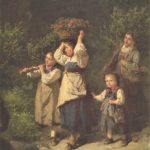 FNS, Université de Berne, CIRM (Interdisciplinary Centre for Mountain Research, Université de Lausanne) (Web)
FNS, Université de Berne, CIRM (Interdisciplinary Centre for Mountain Research, Université de Lausanne) (Web)
Time: 09.-11.06.2021
Venue: virtual space, via Berne
A travers une perspective centrée sur les acteurs rices, ces deux journées scientifiques se donnent pour objectif d’interroger de maniére transversale et européenne les pratiques et les parcours de vie entre sphéres publique et privée dans les régions alpines et préalpines, au prisme des écrits du for privé. Il s’agira également de mieux cerner la diversité et la pluralité des parcours vécus ainsi que la nature des relations de genre, dans un cadre social, politique et religieux particulier caractérisé, entre autres, par une grande mobilité des individus. Ainsi, les stratégies autonomes, la subjectivité ou encore les pouvoirs informels des femmes confrontées á l’absence des hommes seront particuliérement mis en lumiére.
La manifestation se veut aussi un moment de rencontre entre spécialistes afin de discuter des nouvelles approches méthodologiques centrées sur les acteurs rices pouvant amener á une relecture du role des femmes dans les sociétés alpines d’Ancien Régime.
Program (PDF)
The international conference will be in English and French. If you wish to have the link to attend, please contact aline.johner@unil.ch
Scientific Committee: Patrizia AUDENINO, Università degli Studi di Milano; Dionigi ALBERA, University of Aix-Marseille; Stefania BIANCHI, Archivio storico ticinese; Jasmina CORNUT, University of Lausanne; Sandro GUZZI-HEEB, University of Lausanne; Miriam NICOLI, University of Bern
Monthly Archives: Mai 2021
Booklaunch: Science in the Metropolis: Vienna in Transnational Context, 1848–1918, 31.05.2021, virtual space
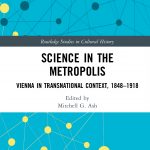 History of Science in Central, Eastern, and Southeastern Europe (HPS.CESEE) (Web)
History of Science in Central, Eastern, and Southeastern Europe (HPS.CESEE) (Web)
Time: 31.05.2021, 17-19.00 Uhr
Venue: virtual space, via Vienna
The virtual platform HPS.CESEE presents its forthcoming book talk. Dorothee Brantz (Berlin) and Oliver Hochadel (Barcelona) will join Mitchell Ash (Vienna) to comment on the recent book, Science in the Metropolis, in a discussion moderated by Jan Surman (Prague).
Description: „Vienna in Transnational Context, 1848–1918 presents new research on spaces for science and processes of interurban and transnational knowledge transfer and exchange in the imperial metropolis of Vienna in the late nineteenth and early twentieth centuries. Chapters discuss Habsburg science policy, metropolitan natural history museums, large technical projects including the Ringstrasse and water pipelines from the Alps, urban geology, geography, public reports on polar exploration, exchanges of ethnographic objects, popular scientific societies and scientifically oriented adult education. The infrastructures and knowledge spaces described here were preconditions for the explosion of creativity known as ‚Vienna 1900.'“
The meeting is free and open to the public. To receive the link, please register here or write to hps.cesee@gmail.com.
Discutants
- Mitchell G. Ash is Professor Em. of Modern History at the Univ. of Vienna, Austria, and a member of the Berlin-Brandenburg Academy of Sciences and Humanities as well as the European Academy of Sciences and Arts.
- Dorothee Brantz is Professor and Director at the Center for Metropolitan Studies, Technical Univ. of Berlin. Her most recent book publication is: Urban Resilience in a Global Context: Actors, Narratives, Temporalities. Co-edited with Avi Sharma (Bielefeld: Transcript, 2020) open access.
- Oliver Hochadel is a historian of science and a tenured researcher at the Institución Milá y Fontanals de Investigación en Humanidades (CSIC, Barcelona).
Mitchell G. Ash (Ed.): Science in the Metropolis: Vienna in Transnational Context, 1848–1918 (Routledge 2021) (Web).
Klicktipp: Doing Corona! Historische Perspektiven auf Covid-19 (Website)
 Von Cholera zu Corona. Historische Perspektiven auf Covid-19 (Web)
Von Cholera zu Corona. Historische Perspektiven auf Covid-19 (Web)
Wie ist die Covid-19-Pandemie als soziales, politisches und kulturelles Ereignis zu deuten? Mit dieser Frage haben sich 27 Master-Studierende an der Universität Wien in einer Lehrveranstaltung von Katharina Kreuder-Sonnen beschäftigt. Die spannenden Ergebnisse ihrer historisch-kulturwissenschaftlichen Untersuchungen wurden soeben auf der Website „Doing Corona!“ veröffentlicht (Web).
Die Website enthält die folgenden Sektionen:
- Solidarität! Aber nicht für alle. Frauen in der Covid-19-Krise (Link)
- Corona und Ich. Individuelle Verantwortung in der Covid-19-Pandemie (Link)
- „Lässt du dich impfen?“ Impfdebatten zwischen Wissenschaft und Öffentlichkeit in österreichischen Tageszeitungen (Link)
- Covid, Krisen, Konspirationen. Verschwörungstheorisches Impfgegnertum und Othering in Zeiten von Seuchen (Link)
- Kultur allein Zuhaus‘. Selbstverständnis von Kulturschaffenden in der Corona-Krise (Web)
- Krieg Sport Mathematik. Metaphern in der Kommunikation der österreichischen Bundesregierung (Web)
Beschreibung: „Die Corona-Pandemie ist nicht nur ein epidemiologisches, sondern auch ein kulturelles Ereignis. Es wird erfahren, gedeutet und angeeignet. Im Wintersemester 2020/21 haben sich 27 Studierende im Rahmen eines Forschungsseminars am Institut für Zeitgeschichte aus historischer Perspektive mit den soziokulturellen Dimensionen von Corona befasst. Historische Perspektive heißt hier: Den Umgang mit Seuchen nicht als selbstverständlich und per se rational zu betrachten, sondern wissenschaftliche, politische und kulturelle Deutungen der Pandemie als zeit- und raumspezifisch zu verstehen.
In Kleingruppen haben die Studierenden sechs Forschungsprojekte zum österreichischen Umgang mit Covid-19 entwickelt, deren Ergebnisse hier in kurzen Beiträgen zusammengefasst werden. Erfahren Sie mehr über die historischen Dimensionen von Verschwörungstheorien, die Metaphern der Corona-Politik, Corona-Memes, die Lücken des Solidaritätsdiskurses, Impfdebatten, Kultur im Lockdown oder die Frage, wie das verantwortungsbewusste Individuum zur zentralen Akteur:in der Seuchenbekämpfung wurde.“
Klicktipp: NOTCHES: (Re)Marks on the History of Sexuality (Weblog)
 NOTCHES: (Re)Marks on the history of sexuality (Web)
NOTCHES: (Re)Marks on the history of sexuality (Web)
NOTCHES is a open-access, peer-reviewed, collaborative and international weblog, sponsored by the Raphael Samuel History Centre in London. The postis are sorted by different categories. In addition to a geographical assignment or a time period, there are content categories. These are – among others – the following:
Feminism (Web)
- including: Beyond the Binary: Science, History, and the Radical Possibilities of Sex and Gender / Sisterhood and Unity: Lesbian Activism in the (Post-)Yugoslav Space
Women’s Sexuality (Web)
- including: Rethinking Early Modern Women’s Masturbation / Naming & Shaming Women: Reporting on VD Trials During WWI
Masculinity (Web)
- including: Raúl Luis Suarez’s Smile and The Ruthless Archive / “Men Working Together!”: The Queer Masculinity of World War Two Propaganda
LGBTQ (Web)
- including: Troubling Terms: The Label Problem in Transgender History / The Shapes of Fancy: Reading for Queer Desire in Early Modern Literature
Homosexuality (Web)
- including: German, Jew, Muslim, Gay: The Life and Times of Hugo Marcus / The Ambivalence of Gay Liberation: Male Homosexual Politics in 1970s West Germany
18th Century (Web)
- including: The Queer Case of Catherine/Giovanni Vizzani / The Closet: The Eighteenth-Century Architecture of Intimacy
Archives (Web)
- including: Collecting Riot Grrrl: Sexual Awakening in NYU’s Punk Archive / Out of the Closet, Into the Archives: Researching Sexual Histories
Klicktipp: Schusterstochter, Weberkind: Die ersten Parlamentarierinnen (Podcast)
 Österreichisches Parlament: Podcast „Parlament erklärt“
Österreichisches Parlament: Podcast „Parlament erklärt“
1919 zogen erstmals Frauen in das Österreichische Parlament ein. Auf dessen Website finden sich zusammengefasste biografische Angaben und weiterführende Informationen zu diesen 8 Politikerinnen (Web).
Im Podcast „Parlament erklärt“ (Web) wurde ihnen zudem die Reihe „Die ersten Parlamentarierinnen“ gewidmet. Seit kurzem sind hier die Folgen zu allen 8 Frauen veröffentlicht. Bei mehreren davon hat die Historikerin Gabriella Hauch mitgewirkt, bei der Folge zu Adelheit Popp Katharina Prager.
Anna Boschek (1874–1957)
- Folge 10: „Pionierin der Gewerkschaft“ (Link)
Adelheid Popp (1869–1939)
- Folge 14: „Vom Weberkind zur politischen Leitfigur“ (Link)
Hildegard Burjan (1883–1933)
- Folge 19: „Gründerin der Caritas Socialis“ (Link)
Emmy Freundlich (1878–1948)
- Folge 21: „Einzige Frau in der Wirtschaftssektion des Völkerbundes“ (Link)
Gabriele Proft (1879–1971)
- Folge 27: „Parlamentarierin der Ersten und Zweiten Republik“ (Link)
Therese Schlesinger (1863–1940)
- Folge 33: „‚Zentralküchen‘ für Arbeiterfamilien“ (Link)
Maria Tusch (1868–1939)
- Folge 38: „Für Straffreiheit der Abtreibung“ (Link)
Amalie Seidel (1876–1952)
- Folge 42: „Mit 17 Jahren organisiert sie einen Streik“ (Link)
Unter der Rubrik “Pionierinnen der Politik in Österreich” hat das Österreichische Parlament weitere verschiedene Unterlagen zu diesem Thema online verfügbar gemacht (Web).
Hier ist u.a. die von der Parlamentsdirektion herausgegebene Publikation „FRAUEN IM PARLAMENT. Nationalrat und Bundesrat 1919–1934 1945–2019“ (128 Seiten) abrufbar (PDF).
Book Launch: Eszter Varsa: Protected Children, Regulated Mothers: Gender and the „Gypsy Question“ in State Care in Postwar Hungary, 1949–1956, 25.05.2021, virtual space
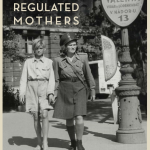 The Department of Gender Studies, Central European Univ., Vienna/Budapest (CEU) and ERC project ZARAH
The Department of Gender Studies, Central European Univ., Vienna/Budapest (CEU) and ERC project ZARAH
Time: Tu, 25.05.2021, 4.00 – 5.30 p.m.
Venue: virtual space, via Vienna (Zoom Link)
Protected Children, Regulated Mothers (CEU Press, 2021) examines child protection in Stalinist Hungary as a part of 20th-century East Central, Eastern, and Southeastern European history. Across the communist bloc, the prewar foster care system was increasingly replaced after 1945 by institutionalization in residential homes. This shift was often interpreted as a further attempt to establish totalitarian control. However, this study—based on hundreds of children’s case files and interviews with institution leaders, teachers, and people formerly in state care—provides a new perspective.
Rather than being merely a tool of political repression, state care in postwar Hungary was often shaped by educators‘ efforts to address the myriad of problems engendered by the social and economic transformations that emerged after World War II. This response built on, rather than broke with, earlier models of reform and reformatory education. Yet child protection went beyond safeguarding and educating children; it also focused on parents, particularly lone mothers, regulating not only their entrance to paid work but also their sexuality. In so doing, children’s homes both reinforced and changed existing cultural and social patterns, whether about gendered division of work or the assimilation of minorities. Indeed, a major finding of the book is that state socialist child protection continued a centuries-long national project of seeking a „solution to the Gypsy question,“ rooted in efforts to eliminate the perceived „work-shyness“ of Roma.
Discussants
- Sonya Michel, Professor Emerita of History, American Studies, and Gender and Women’s Studies, Univ. of Maryland, USA
- Susan Zimmermann, University Professor, CEU, President of the Int. Conference of Labour and Social History, Vienna
- Chair: Francisca de Haan, Department of Gender Studies, CEU
Eszter Varsa is post-doctoral researcher in the ERC project ZARAH: Women’s Labour Activism in Eastern Europe and Transnationally, From the Age of Empires to the Late 20th Century at CEU, Vienna (Web).
For ordering information, please visit the publisher’s website.
Workshop: Rallying Europe. Intersectional Approaches to Youth and Gender in the mid-20th Century, 10.-11.06.2021, virtual space
 Katharina Seibert; Department for Contemporary History, Univ. of Vienna (Web) in coop. with Barnabás Bálint (Univ. of Oxford)
Katharina Seibert; Department for Contemporary History, Univ. of Vienna (Web) in coop. with Barnabás Bálint (Univ. of Oxford)
Time: 10.-11.6.2021
Venue: virtual space, via Vienna
The turmoil of the mid-20th century saw young people mobilized for action across Europe in an unprecedented manner. Concurrently, against the backdrop of the struggle between democratic and authoritarian projects, young people increasingly became a target of state legislation, (mass) organizations and other institutions. From the end of the First World War to the aftermath of the Second World War, Europe witnessed fundamental changes in the social regimes that determined societal power distribution.
This workshop approaches interwar history by looking through the lens of age and gender as interdependent categories of analysis. In doing so, the organizers reveal how adult perceptions of youth and gender framed young men and women’s lives and their roles in society. Furthermore, the organizers explore how these perceptions collided with youth agency, probing the specific age- and gender-related dynamics of empowerment and organization.
By zooming in on the concrete young actors and the institutional settings that limited their scope of action, processes of subjectivation will be contrasted with institutionalized attempts to control and lead the young. As such, the organizers contribute to a global academic discussion on age, gender, the lifecycle, and intersectionality and add to more recent studies of youth that go beyond the analysis of youth organizations.
The full programme is available online (PDF)
Link to the registration (Web). Details about zoom will be sent upon registration.
For further questions, please contact: rallyingeurope.zeitgeschichte@univie.ac.at
6th International Convention on Food and Drink Studies, 31.05.-04.06.2021, virtual space
 European Institute for Food History and Cultures / Institut Européen d’Histoire et des Cultures de l’Alimentation (IEHCA) (Web)
European Institute for Food History and Cultures / Institut Européen d’Histoire et des Cultures de l’Alimentation (IEHCA) (Web)
Time: 31.05.-04.06.2021
Venue: virtual space, via Tours
Program
Mo., 31.05.2021
- 15:30 PM: Welcome: Bruno Lauriox, Françoise Sabban and Loïc Bienassis (IEHCA, Tours), Allen J. Grieco (Harvard Univ., Florence, Italie)
- 15:45 PM: Plenary Lecture: Paul Freeman: Is there such a thing as American Cuisine?
17:00 PM, parallel sessions
- 1: Reading Cookbooks under a New Light. Food, Body and Power in Mexican Recipes (20th-21th centuries)
- 2: Tasty maps. Cartography and patrimonialisation of food between simplification, stereotypes and territory
- 3: L’alimentation des enfants et les savoirs nutritionnels: entre objectifs marchands, éducatifs et de santé
- 4: Diet and Health in the 18th and 18th-Century French and British Caribbean
- 5: Métamorphoses de l’aliment. Les frontières entre les aliments et les médicaments, entre droit agricole et alimentaire, entre normes religieuses et de consommation
- 6: An introduction to the »Atlas of language and texts of Italian gastronomic culture from the Middle Ages to the Unification« (AtLaTIG)
Tu., 10.06.2021
15:00 PM, parallel sessions
- 7: Dialogue entre le vêtement, le corps et les représentations
- 8: Losing it: food and loss during the COVID-19 pandemic
- 9: Why should men abstain themselves from eating meat? Perspectives towards vegetarianism in Ancient Mediterranean world
- 10: Traditional poultry production in France and South East Asia
- 11: Tides of Untold Stories: Subaltern Subjectivities in Maritime Food Geographies; Read more … (Web)
CfP: Die Schwarze Botin. Frauenhefte (Event, 11/2021, Frankfurt a.M.); bis: 30.06.2021
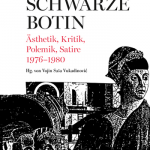 Carola Hilmes und Franziska Haug (NdL) in Koop. mit dem Forschungszentrum für Historische Geisteswissenschaften und dem Cornelia Goethe Centrum der Goethe-Univ. Frankfurt a.M.
Carola Hilmes und Franziska Haug (NdL) in Koop. mit dem Forschungszentrum für Historische Geisteswissenschaften und dem Cornelia Goethe Centrum der Goethe-Univ. Frankfurt a.M.
Zeit: 04.-05.11.2021
Ort: Goethe-Universität Frankfurt a.M.
Einreichfrist: 30.06.2021
Die Frauenzeitschrift „Die Schwarze Botin“ wurde im Oktober 1976 in Berlin gegründet, einen Monat nach der Berliner Frauenzeitschrift „Courage“ und ein Viertel Jahr vor der feministischen Publikumszeitschrift EMMA. Als Herausgeberinnen des streitbaren und dezidiert intellektuellen Projekts in der Tradition einer ‚anderen Aufklärung‘ firmierten bis Dezember 1980 Gabrielle Goettle und Brigitte Classen, die dann nach einer zweijährigen Pause zusammen mit Branka Wehowski die Redaktion übernahm.
Dieser zweite Abschnitt von März 1983 bis zur letzten Nummer im September 1986/Februar 1987 wurde in der von Saša Vukadinovic herausgegebenen Textsammlung „Die Schwarze Botin. Ästhetik, Kritik, Polemik, Satire 1976-1980“ (Göttingen 2020) nicht berücksichtigt. Gleichwohl hat diese Publikation die weitgehend vergessene Zeitschrift mit ihren prominenten Mitarbeiterinnen – die Außenredaktion in Wien hatte Elfriede Jelinek – ins kulturelle Gedächtnis zurückgerufen; das belegt eine breite, zustimmende Rezeption in der Tagespresse (taz, Tagesspiegel, Die Süddeutsche, Die Welt) sowie im Deutschlandfunk und auf Literaturkritik.de.
Ilse Lenz hat ihrerseits den programmatischen Text von Gabrielle Goettle aus dem ersten Heft der „Schwarzen Botin“ in ihre Quellensammlung „Die neue Frauenbewegung in Deutschland – Abschied vom kleinen Unterschied“ (Wiesbaden, 2. aktualisierte Auflage 2010) aufgenommen. Der Text trägt den satirischen Titel „Schleim oder Nichtschleim, das ist hier die Frage. An Stelle eines Vorworts“ und markiert so die Frontstellung der Zeitschrift gegen einen identitären Feminismus, der Selbsterfahrung und Authentizität ins Zentrum rückte – damals prominent vertreten durch Verena Stefans Erfolgsbuch „Häutungen“.
Es fehlt aber noch eine genauere inhaltliche Auseinandersetzung mit den thematisch sehr vielfältigen Beiträgen aus Literatur, Kunst und Gesellschaft sowie eine theoretische Auseinandersetzung mit dem französischen Feminismus, der in „Der Schwarzen Botin“ popularisiert wurde. Zu analysieren wären außerdem Satire, Polemik und Sprachkritik ebenso wie die Einordnung in eine surrealistische Tradition, die sowohl durch die ausgewählten Bilder als auch Continue reading
CfP: Women’s Tailored Clothes across Britain, Europe and America 1750-1920 (Event, 09/2021, Brighton), by: 14./21.06.2021
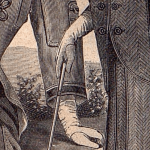 Design University of Brighton and ACORSO Research Interest Group ‘Tailoring for Women 1750–1920’ (Web)
Design University of Brighton and ACORSO Research Interest Group ‘Tailoring for Women 1750–1920’ (Web)
Time: 18.09.2021 and 24./25.09.2021 )*
Venue: Brighton, UK
Proposals due: 14./21.06.2021 )*
This two-day conference aims to explore the following aspects of tailored clothes for women: their material culture and their trans-European and trans-Atlantic diffusions and intersections of design, manufacture, trade and commerce.
The organizers define women’s tailoring as bespoke, ready to-wear and mass manufactured tailored feminine garments made, usually but not always in woollen cloth, by tailors using specific, professional tailors’ pattern cutting and making up skills and processes and sold in couture salons, department stores, individual tailoring establishments and wholesale ready-to-wear companies and through the second-hand clothes trade in the 1750-1920 period. The organizers are including tailors/tailoring from Britain, Europe and North America in their research. Dressmakers also, though far less frequently, also designed and made up such garments and the organizers include them too.
Program
- Day One: 18.09.2021: Tailored clothes for women in Ireland-1750-1920 in the context of Irish social history
- Day Two: 24./25.09.2021: The Transnational Diffusion of Women’s Tailoring style across Britain, Europe and America: 1750-1920
)* Note from the editor of Salon 21: There are two different details circulating regarding the date of the second event as well as the submission date:
- Read more and source … (Weblog)
- Read more and the other source … (Web)
